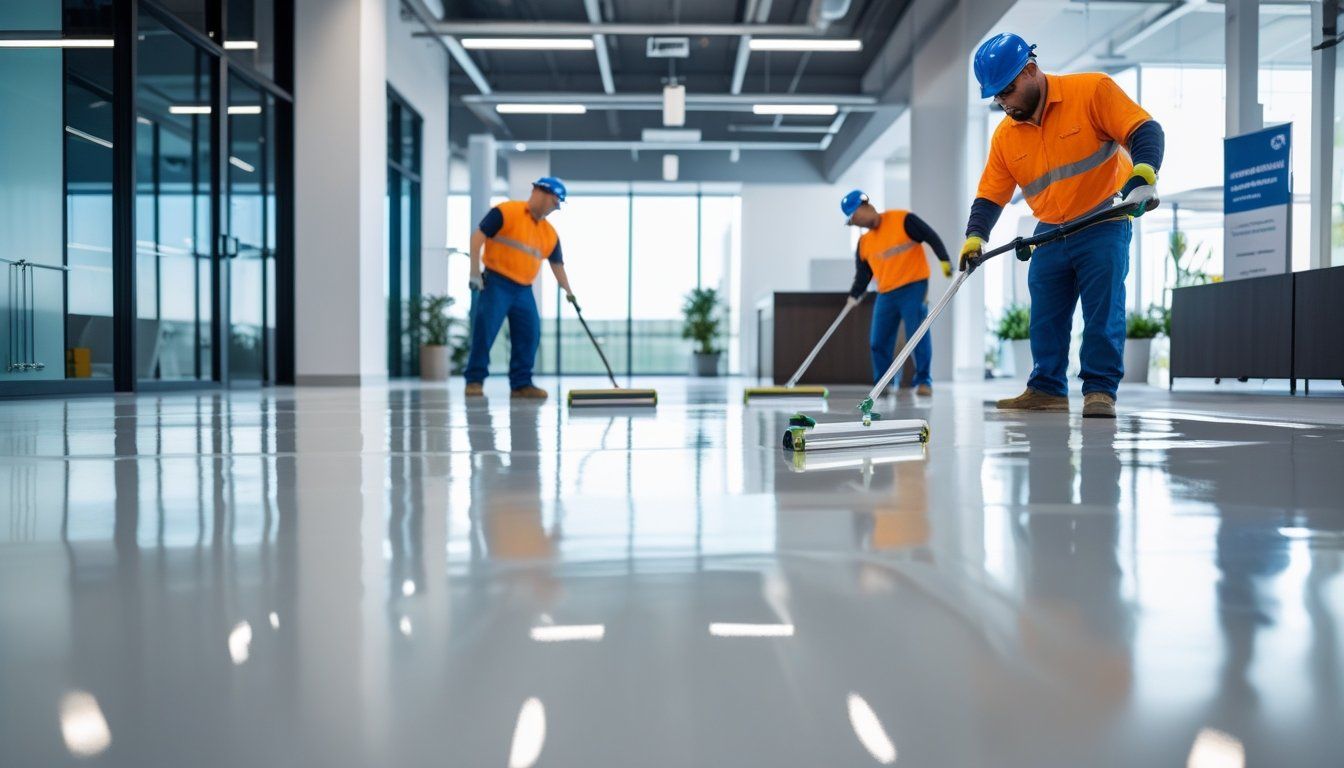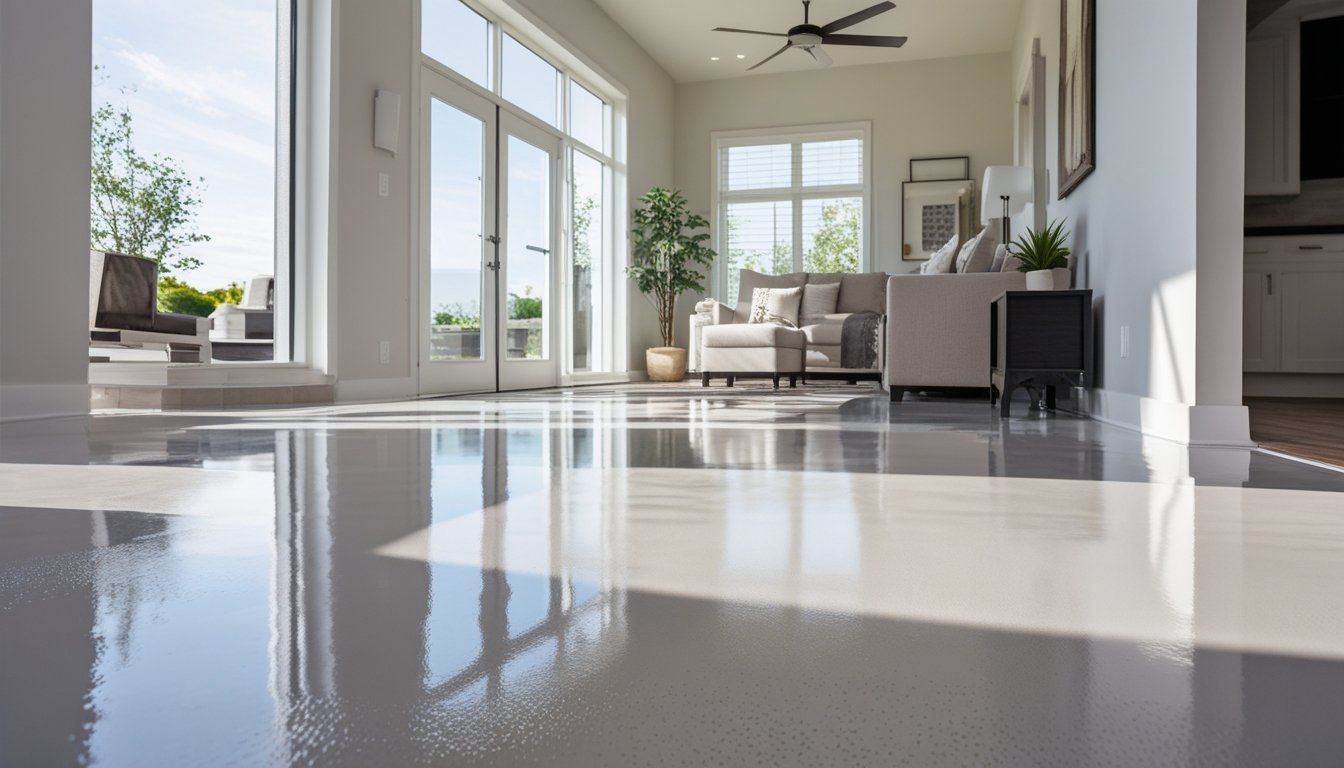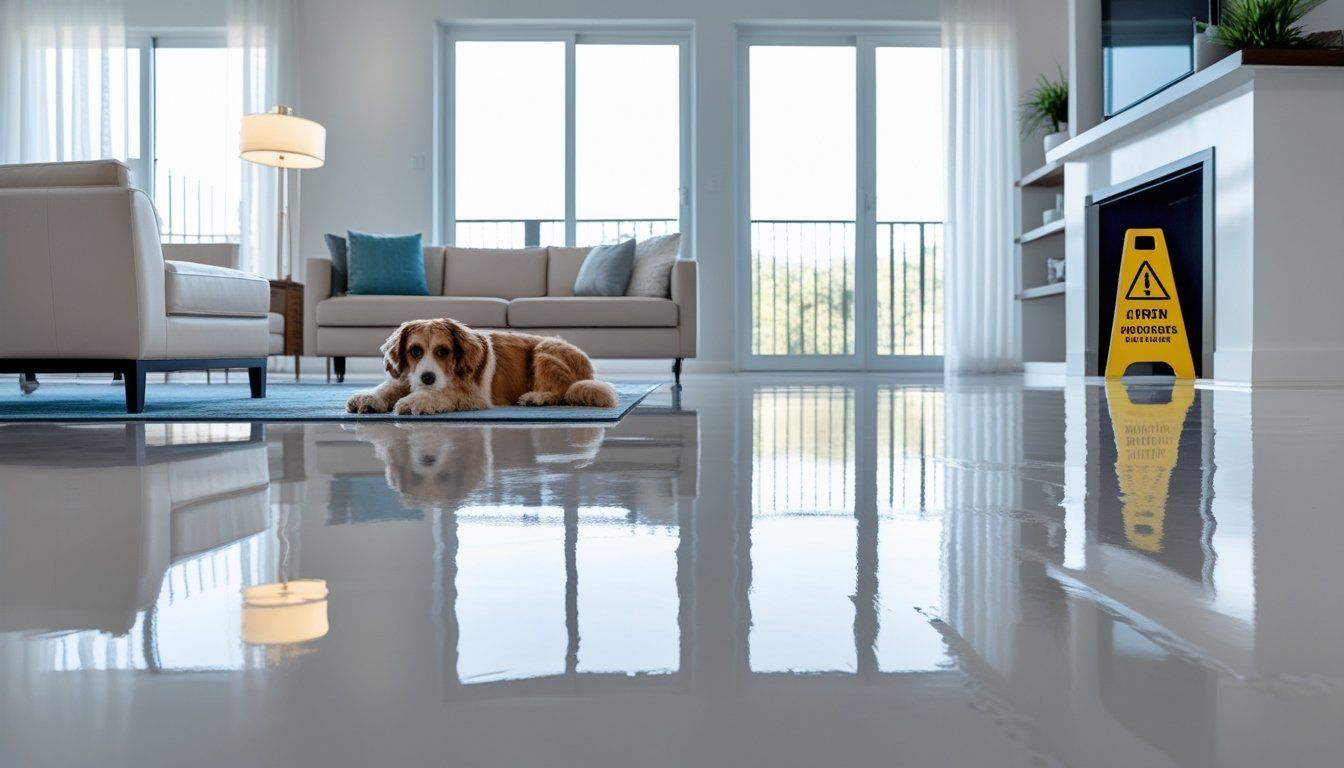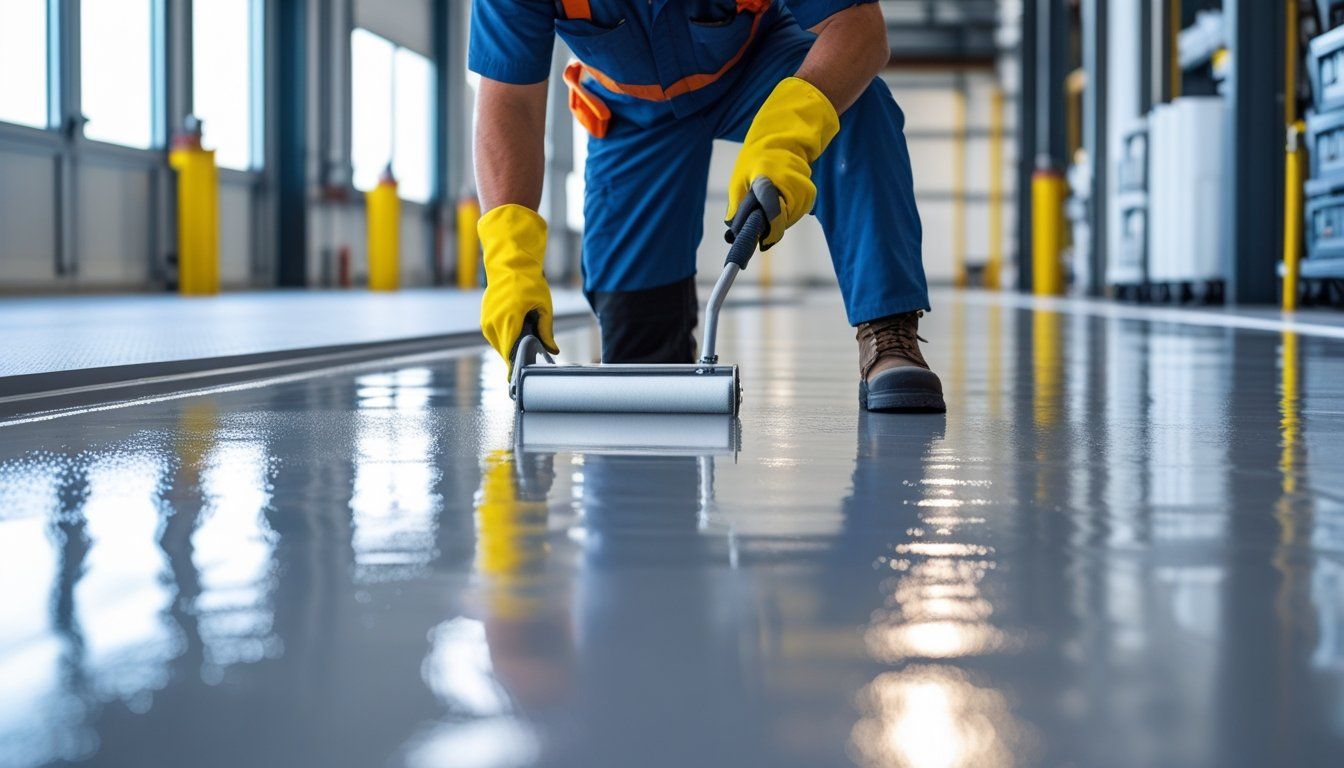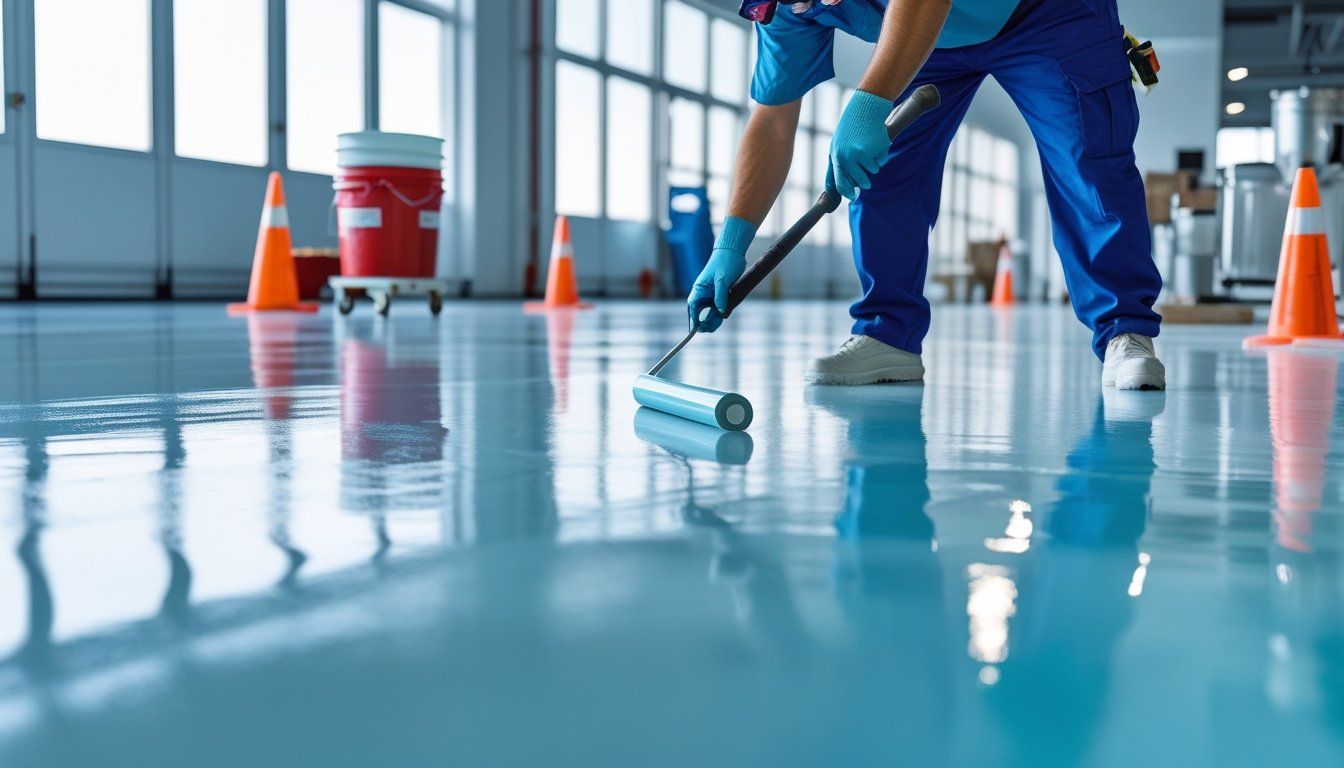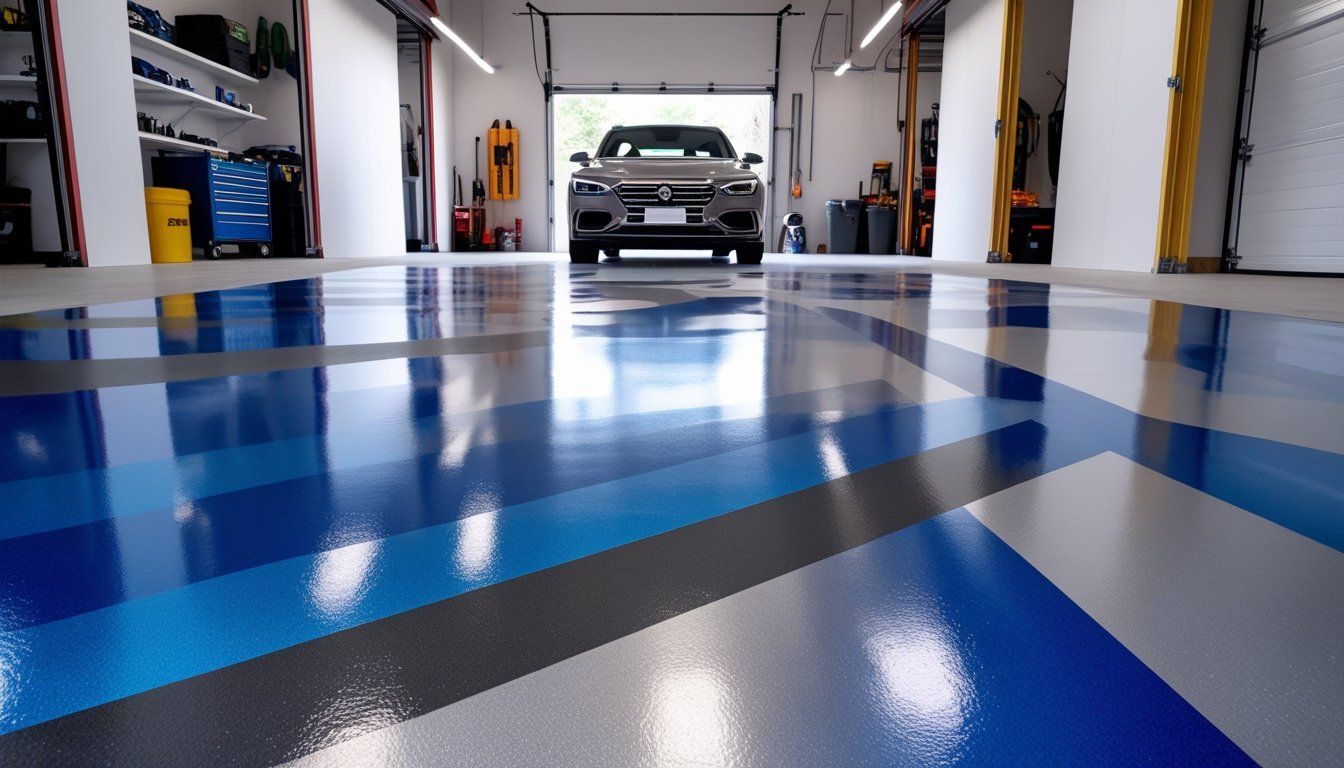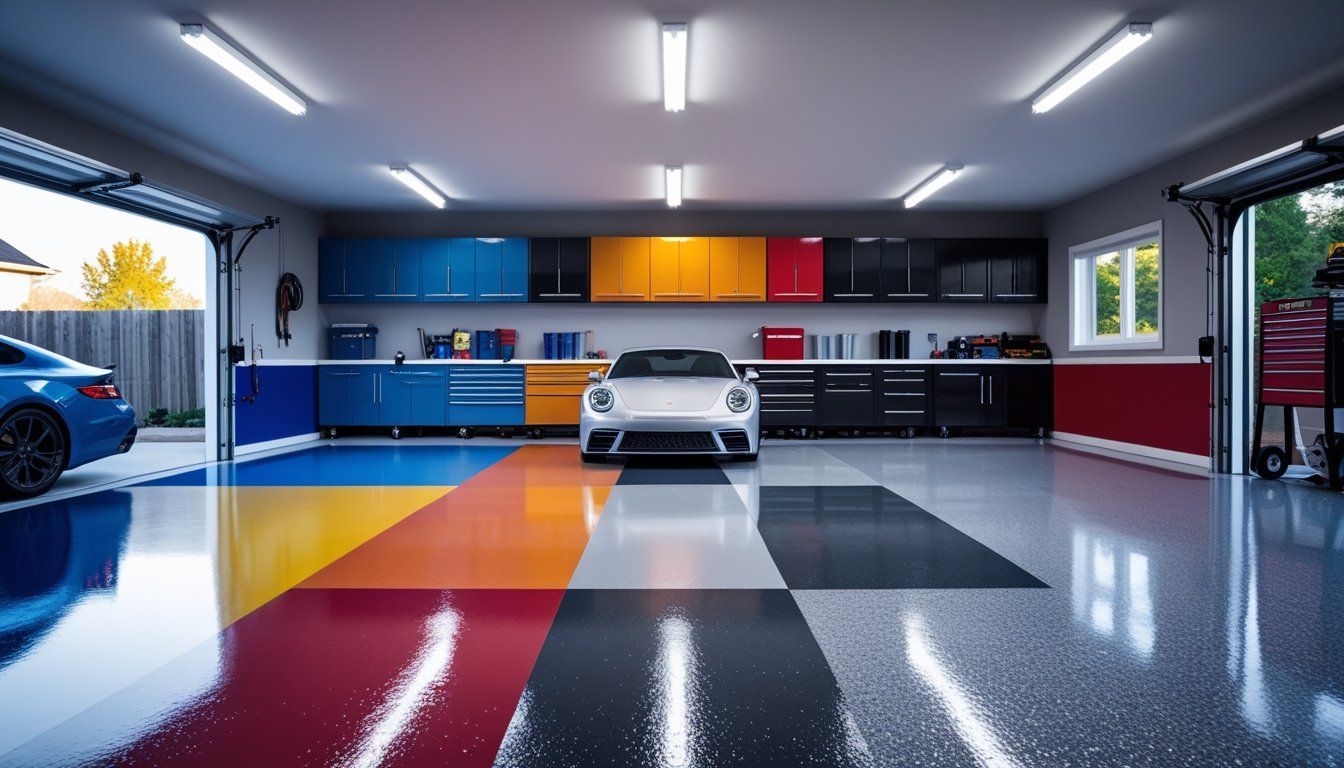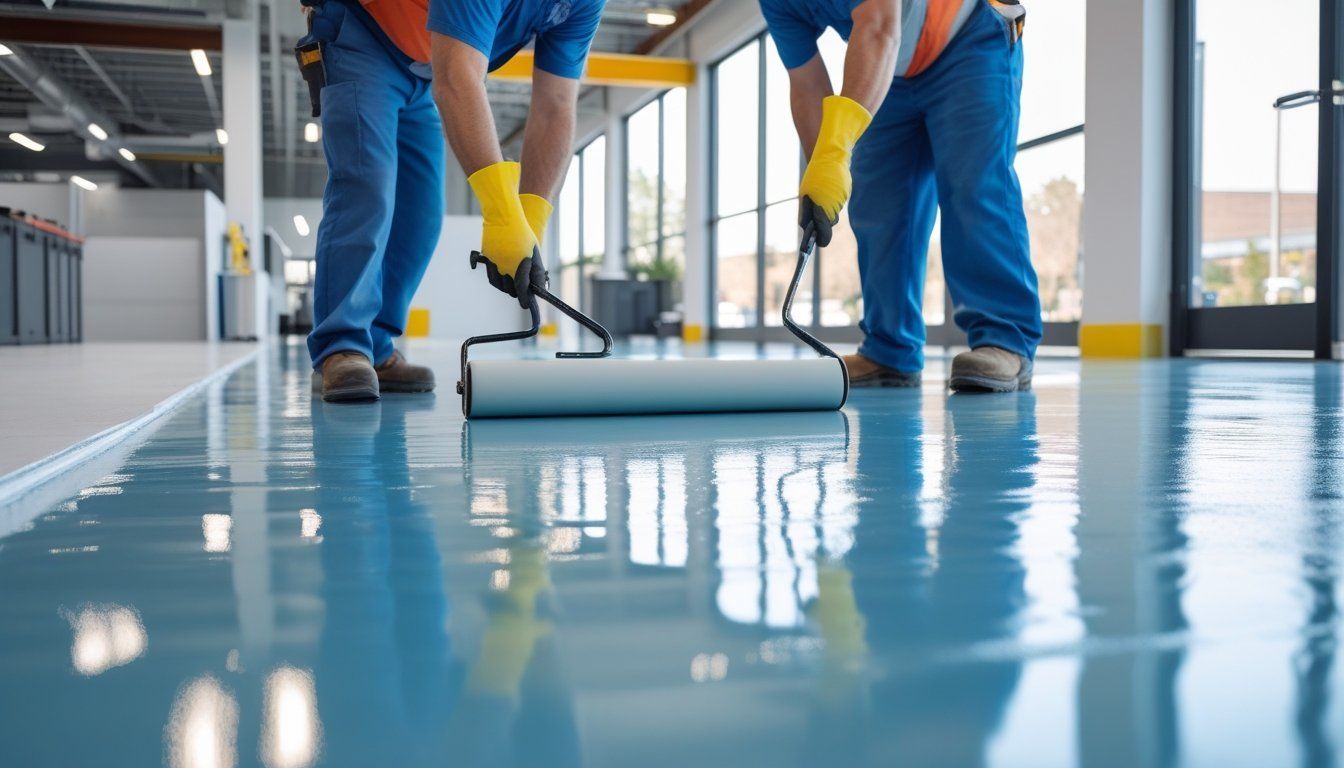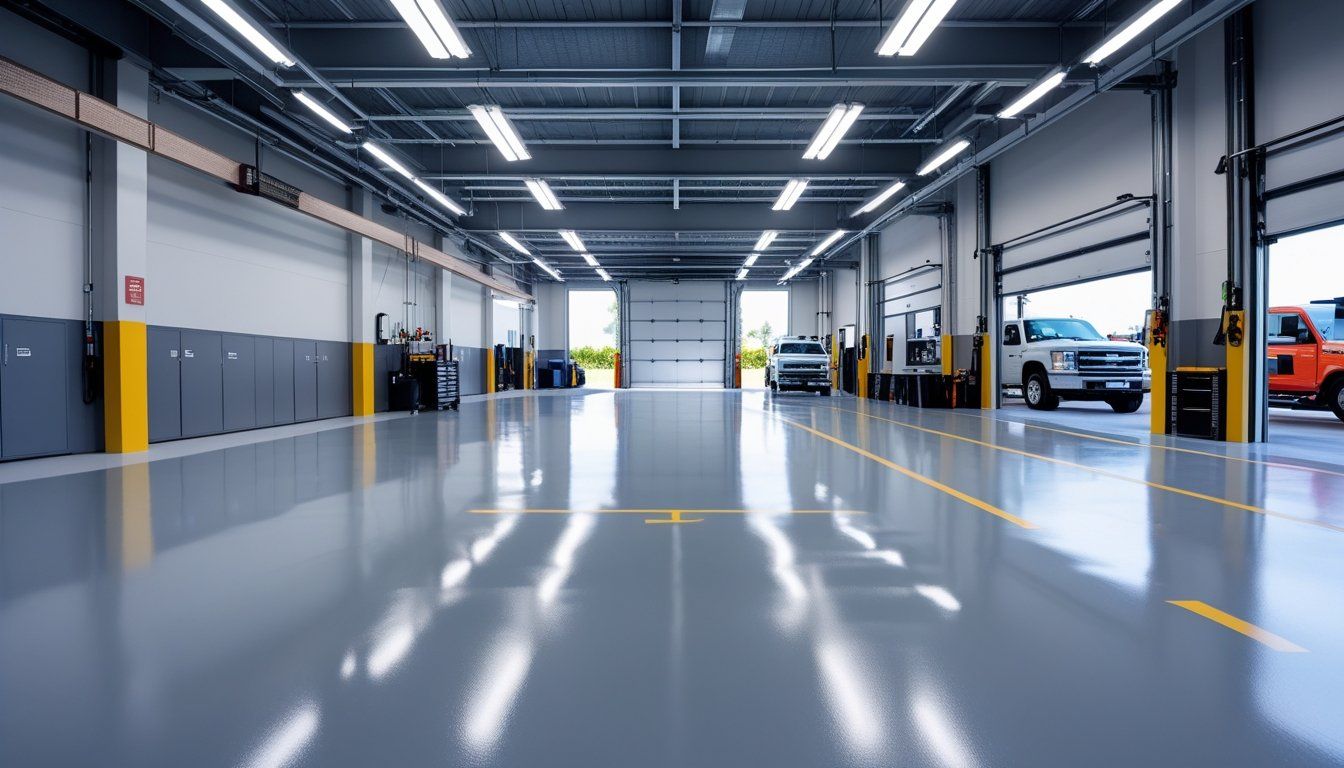Epoxy Resin Flooring in Cambridge MA | Durable & Stylish
Daniel McGonagle • October 14, 2025
Epoxy resin flooring delivers a seamless, durable surface that stands up to daily wear. It resists stains, spills, and abrasion while staying easy to clean and maintain. For homes and businesses, it pairs everyday practicality with a polished, modern look.
Cambridge MA Epoxy Flooring brings local expertise
to installations across Cambridge and Greater Boston.
Our team helps you choose colors, textures, and finishes that fit your space while ensuring long-term performance in New England conditions.
This guide covers what epoxy resin flooring is, its core components, and how it’s installed. You’ll see popular types, design and safety options, maintenance tips, costs, and contractor questions. Use it to plan a floor that’s stylish, durable, and easy to live with.
What Is Epoxy Resin Flooring?
Epoxy resin flooring is a strong, long-lasting floor coating made by mixing two main chemicals. It creates a tough surface that protects your floors from damage while adding a clean, attractive look. You can customize it with different colors and textures to fit your space.
Key Components of Epoxy Resin
Epoxy resin flooring is made from two main parts: resin and hardener. When these two are mixed, they react chemically and form a rigid plastic material. This bond sticks tightly to concrete floors, making them resistant to damage.
The resin provides durability, while the hardener helps it set and become solid quickly. This combination creates a surface that handles heavy traffic, spills, and stains very well. You can find different types of epoxy with varying strengths depending on your needs.
A professional installer helps choose the right blend for your home or business.
How Epoxy Flooring Works
Once mixed, the epoxy liquid is poured over your prepared concrete floor. It spreads evenly, filling cracks and creating a smooth finish. After it cures, the floor becomes hard, shiny, and resistant to chemicals and moisture.
The cured epoxy forms a seamless layer that keeps dirt and liquids from soaking into the surface. This makes it easier to clean and maintain compared to bare concrete. Because epoxy bonds tightly with concrete, it extends the floor’s life and prevents wear from daily use.
Varieties of Epoxy Floors
Epoxy flooring comes in several styles to fit different spaces. The most common types include:
- Solid Epoxy: A thick, smooth coating with a shiny finish. It’s ideal for garage floors and showrooms.
- Metallic Epoxy: Adds a reflective, swirling metal look. Often used to make floors stand out in homes or upscale shops.
- Flake Epoxy: Mixed with colored flakes for texture and slip resistance. Great for busy commercial or industrial areas.
- Quartz Epoxy: Embedded with quartz granules for extra grip and durability. Perfect for places where safety matters most.
Each type balances looks and function. An expert can help you pick the right style based on how your space will be used.
Benefits of Epoxy Resin Flooring
Epoxy resin flooring offers a strong, clean surface that handles heavy use and everyday spills. It keeps your floors looking good with less work. This type of flooring is tough against damage, chemicals, and stains while being easy to keep clean.
Slip-Resistant Finishes To Support OSHA Safety
Slip resistance should be planned, not assumed. According to OSHA, managing walking-working surface
hazards is essential for preventing falls in busy facilities. Textured epoxy, quartz broadcasts, or fine grit additives improve traction in wet or oily zones.
When scoping finishes, require a documented slip-resistance spec and verify it after cure. Pair coatings with cleaning protocols and signage so floors stay safe as conditions change throughout the day.
Durability and Longevity
Epoxy flooring creates a hard, solid layer stuck firmly to your concrete floor. This layer can handle heavy foot traffic, tools, and machinery without cracking or chipping.
Because it bonds tightly to the surface, it lasts much longer than paint or other coatings. It resists scratches and dents, keeping your floors looking new for years.
This makes it ideal for homes and businesses in Cambridge and Greater Boston that need reliable flooring every day.
Resistance to Chemicals and Stains
Epoxy floors resist many kinds of chemicals, like oils, grease, and cleaning supplies. This means spills won’t soak in or leave permanent marks, which can happen with concrete alone.
In spaces like workshops or warehouses, this protection keeps floors safe from damage caused by harsh substances. Stains from foods, paint, or dirt wash off easily without staining the surface.
The sealed coating also slows mold, germs, and bacteria from growing, helping keep your environment cleaner. If your home or business deals with spills often, epoxy flooring helps reduce long-term staining and damage.
Ease of Maintenance
Epoxy floors are very simple to clean. You only need to sweep or mop with basic cleaners to keep the surface looking fresh.
The smooth, sealed surface stops dirt and dust from sticking, so cleanup takes less time. Unlike untreated concrete, you won’t need to reseal or refinish epoxy often.
Its resistance to wear means fewer repairs or special treatments. A trusted company offers expert installation that ensures your floor stays easy to maintain in the tough Boston climate and busy local homes or offices.
Applications of Epoxy Resin Flooring
Epoxy resin flooring works well in many settings because it is strong, easy to clean, and can be customized. You can use it in places that need protection from wear, spills, or heavy foot and vehicle traffic. It also helps improve safety by offering slip resistance and chemical resistance.
Industrial Environments
In industrial spaces like warehouses, factories, and labs, epoxy flooring handles tough conditions. It withstands heavy machinery, constant foot traffic, and chemical spills without getting damaged. You’ll also benefit from its anti-slip properties, which keep workers safer.
Industrial floors often have to meet strict safety and cleanliness rules. Epoxy flooring is a good fit since it is seamless and reduces dust buildup. If your concrete has cracks or stains, epoxy hides and fixes those while adding strength.
Commercial Spaces
For businesses, epoxy floors offer a clean, professional look that’s simple to maintain. Offices, gyms, retail stores, and restaurants often use
epoxy because it resists stains, scratches, and heavy foot traffic.
You can pick colors and finishes that match your branding or style. Epoxy also adds slip resistance, which makes places safer for customers and employees. It dries quickly, so you won’t lose much business during installation. Its easy clean-up keeps maintenance work low.
In Greater Boston, local installers help you get floors that keep your commercial space looking sharp and functioning well.
Residential Use
You can upgrade your home with epoxy floors in garages, basements, and workshops. Epoxy protects concrete from oil stains, moisture damage, and cracks.
It also brightens spaces with options like metallic or flake finishes to match your style. Epoxy floors are tough enough to handle cars, kids, and pets while staying easy to sweep and mop.
They often improve safety by adding anti-slip textures. Whether you’re in Cambridge or nearby towns, residential epoxy flooring is an affordable way to boost your home’s look and value.
Popular Types of Epoxy Resin Flooring
Epoxy resin floors come in many forms, each suited to different needs. Some floors create smooth, shiny surfaces that look great. Others add texture for extra grip and strength. You can choose based on how you plan to use your space and what kind of wear it will face.
Self-Leveling Epoxy
Self-leveling epoxy spreads easily across your floor, creating a smooth, seamless surface. It fills in cracks and uneven areas well, making your floor look polished and even.
This type is great for spaces where you want a clean, shiny finish, such as showrooms or garages. It dries quickly and is resistant to chemicals and stains.
You’ll find it simple to clean, too, so maintenance is easy. Self-leveling epoxy works best in places with light to medium traffic.
Epoxy Mortar Floors
Epoxy mortar floors mix epoxy resin with sand or other hard fillers. This creates a very tough, thick surface designed to handle heavy machinery and lots of foot traffic.
It’s perfect for industrial spaces like warehouses or factories. The texture is rougher than self-leveling epoxy, which helps prevent slipping.
It can withstand impacts and heavy loads better than many flooring types. Mortar floors require professional installation because the mix is thicker and harder to spread evenly.
Quartz-Filled Epoxy Floors
Quartz-filled epoxy floors combine epoxy resin with colored quartz sand. This makes the surface both decorative and highly resistant to wear.
The quartz adds a textured, slip-resistant finish that’s great for busy areas like kitchens, gyms, or retail stores. You get a durable floor that holds up well to chemicals and moisture.
Plus, the colors and textures can be customized to match your style. Quartz-filled epoxy is a favorite for both residential
and commercial spaces around Cambridge and Greater Boston, thanks to its balance of beauty and function.
Epoxy Resin Flooring Installation Process
Installing epoxy resin flooring involves careful preparation, precise mixing and application, and proper curing to create a durable, neat surface. Each step matters to ensure your floor looks great and lasts a long time, whether in your home, office, or industrial space.
Surface Preparation
Before applying epoxy, your concrete floor must be clean and smooth. Remove all dirt, oil, grease, or old coatings. Use a degreaser or heavy-duty cleaner to clear stains and grime. Any cracks or holes should be patched and sanded to create a level surface.
Next, roughen the floor by grinding or acid etching. This helps the epoxy stick strongly. After this, vacuum and wipe the floor to remove dust and debris. The surface should be dry before you move on.
Proper preparation prevents peeling and ensures a long-lasting finish that stands up to daily use.
Mixing and Application
Epoxy resin is made by combining resin and hardener in specific ratios. Mix these parts carefully, following the product instructions to avoid uneven curing.
Mixing for at least 2–3 minutes is important until the blend looks smooth and uniform. Once mixed, you apply the epoxy quickly using a roller or squeegee.
Work in small sections, spreading the epoxy evenly. Avoid thick layers to prevent bubbling and cracking. You can add decorative flakes or metallic colors during this step for a custom look. If needed, apply multiple coats, letting each one dry first.
Curing and Finishing
After application, the epoxy needs time to cure fully. This typically takes 24 to 72 hours, depending on temperature and humidity. Keep the area well-ventilated and avoid walking or placing objects on the floor during this time.
A final clear coat may be applied to add extra shine and protection. This coat also helps with slip resistance if you choose an anti-slip finish. Wait for the floor to harden completely before using the space, ensuring it stays durable and easy to clean.
Design and Customization Options
Epoxy resin flooring offers many ways to create a look that fits your space perfectly. From a wide range of colors and patterns to textures that add safety and grip, you can customize your floors to meet both style and practical needs.
Colors and Patterns
You can choose from over 140 colors, including solid shades, metallic sheens, and marble-like swirls. Options like color blocking or geometric patterns can make your floor stand out with a modern feel.
Metallic pigments add depth and shimmer, working well in places like showrooms or home gyms. You can also embed logos or custom designs for a truly unique floor.
Solid colors offer a clean, classic look that suits almost any room. Trusted companies help you pick the right color and pattern to complement your home or business while making sure the floor lasts.
Textured and Non-Slip Finishes
Safety is key, especially in busy or wet areas. Epoxy flooring can include textured elements like decorative flakes or grit to increase traction.
This makes floors less slippery without affecting the smooth, polished look you want. Non-slip coatings meet standards for workspaces
and garages to reduce accidents.
You can choose textures that balance grip with ease of cleaning, so your floors stay safe and low-maintenance. Our team in Cambridge understands local needs and can install surfaces tailored to your space, adding durability and safety in every step.
Maintenance and Care Tips
Keeping your epoxy floor looking great and lasting longer needs some simple care. Regular cleaning prevents dirt buildup, and quick repairs stop small problems from getting worse.
Regular Cleaning Suggestions
Sweep or dust mop your epoxy floor daily to remove dirt and grit that can cause scratches. Use a soft broom or microfiber mop for this job.
For deeper cleaning, use a pH-neutral cleaner mixed with warm water. Avoid harsh chemicals like ammonia, bleach, or vinegar.
These can dull or damage the epoxy surface. Mop gently with a soft mop and make sure not to use abrasive scrubbers.
Rinse the floor well to remove any residue. Dry with a clean towel or let it air dry.
Keep spills cleaned up quickly to prevent stains or sticky buildup.
Repairing Minor Damage
If your floor has minor scratches, chips, or small cracks, fix them quickly to avoid bigger repairs later. Light scratches can sometimes be buffed out using a fine abrasive pad and wax polish made for epoxy.
For chips or cracks, use a two-part epoxy repair kit. Clean the damaged area well, apply the epoxy patch smoothly, and let it cure fully. Avoid heavy foot traffic or machinery on the floor until repairs are complete to prevent damage from spreading.
If you notice frequent damage or larger cracks, contact an expert. We can help assess and provide professional repairs tailored to your floor’s needs.
Choosing the Right Epoxy Resin Flooring Contractor
Picking the right contractor is key to getting strong, reliable epoxy flooring that looks good and lasts. You want someone with real experience who communicates clearly and answers your questions fully.
Checking their qualifications and knowing what to ask helps you avoid problems and get the best results.
Evaluating Experience and Qualifications
Look for a contractor with several years of experience in epoxy flooring, especially in your area. Experience means they know how to handle different surfaces, traffic levels, and climate conditions in Cambridge and surrounding towns.
Ask if they have completed projects like yours, whether for homes, stores, or factories. Experienced installers will have a portfolio or references to show you.
Make sure the company is licensed and insured. This protects you in case of accidents or damage during the work. Insurance shows they follow industry rules and take responsibility for their work.
Questions to Ask Providers
Before you decide, ask clear questions to compare contractors. Important questions include:
- How thick will the epoxy resin be applied? Thickness affects durability.
- Can you provide references or show past projects?
- Are you licensed and insured?
- What warranty or guarantee do you offer?
- How long will the installation take, and what is the cleanup process?
- Do you offer custom colors or textures like anti-slip finishes?
Write down answers to compare and pick the best fit.
A good contractor
will answer these questions clearly, giving you confidence that their work meets your quality and safety needs. If you’re in Cambridge or Greater Boston, local knowledge is a plus to handle any unique area concerns.
Cost Factors for Epoxy Resin Flooring
When planning for epoxy resin flooring, you’ll find that costs depend on a few main things. The price mainly comes from the materials used and the labor needed for proper installation. Both play a big role in how much you’ll pay and the final look and durability of your floor.
Material Costs
Material costs vary based on the type of epoxy and any extras you choose. Basic epoxy coatings are more affordable, while decorative flakes or metallic finishes add to the price.
You also pay for primers, sealants, and sometimes anti-slip additives. Prices usually range from $3 to $12 per square foot for materials alone.
Higher-quality epoxy lasts longer and resists chemicals better, which can save you money over time. If your floor has cracks or stains, you might need patching materials or extra prep products.
Choosing the right mix matters because cheaper materials often wear down faster. Our team uses top-grade products to ensure your floors hold up in homes, businesses, or factories across Greater Boston.
Labor Considerations
Labor costs depend on the floor size, condition, and complexity of the job. Prep work is key: cleaning, grinding, and repairing cracks either adds to or cuts down labor time.
Poor surface prep causes problems later, so experts take care to do it thoroughly. Installers often charge around $4 to $8 per square foot for applying epoxy, but prices can vary by location and job difficulty.
Decorative floors with patterns or custom textures cost more because they take longer to apply. When you hire local professionals, you get skilled workers who handle your project carefully and quickly. This means less downtime for your business and a smoother installation for your home.
Environmental Impact and Sustainability
Epoxy resin flooring is known for its strength and long life. Because it lasts a long time, you won’t need to replace your floors often, which helps reduce waste.
Many epoxy coatings now have low VOC (volatile organic compound) emissions, which means they release fewer harmful chemicals into the air. This keeps your indoor space healthier and lowers environmental impact.
Some brands offer epoxy with bio-based content that reduces reliance on fossil fuels. This helps support more responsible manufacturing.
Keep in mind, epoxy is made from resins and hardeners, which involve chemicals. Proper installation and disposal are important to minimize risks.
Get Long-Lasting Epoxy Resin Floors in Cambridge, MA
Epoxy resin flooring brings together strength, style, and long-term value. Its seamless, low-maintenance surface resists wear, spills, and heavy traffic, making it ideal for homes, offices, and industrial spaces alike.
Cambridge MA Epoxy Flooring provides expert installation and high-quality materials tailored to New England conditions.
Our team focuses on durable, attractive floors that last for years while improving safety and efficiency in your space.
Ready to upgrade to epoxy resin flooring that looks great and works hard every day?
Reach out today
to schedule your free consultation and discover a flooring solution built for your home or business.
Frequently Asked Questions
Epoxy resin flooring offers a strong, smooth surface that lasts many years. It can fit many needs while being easy to keep clean and safe.
What are the advantages of epoxy resin flooring over traditional flooring materials?
Epoxy floors are more durable than regular concrete or tile. They resist stains, spills, and heavy wear better. They are easy to clean and often have a shiny, polished look. Epoxy also lets you customize colors and textures to fit your style.
How do you prepare a concrete surface for epoxy resin flooring application?
Your concrete must be clean and dry before applying epoxy. Remove any oil, dirt, or loose material. Cracks or holes should be fixed first. Sometimes the surface needs to be roughened with sanding or grinding to help the epoxy stick well.
Can epoxy resin flooring be applied to wooden surfaces, and if so, how?
Yes, epoxy can go on wood, but the wood must be smooth, dry, and sealed. You may need to sand the wood and use a special primer made for wood before adding epoxy. This stops the wood from absorbing too much resin and helps the epoxy last longer.
What factors influence the cost of installing an epoxy resin floor?
Cost depends on the size of your space and the condition of the floor. More cracks or stains to fix will add to the price. Custom colors and designs also cost more. You should factor in labor and the type of epoxy used—some formulas are stronger or faster to install.
How do resin flooring and epoxy flooring differ?
Epoxy is a type of resin, but not all resin floors are epoxy. Epoxy cures to a very hard, glossy finish. Other resins might feel softer or have different drying times. Epoxy is often chosen for its toughness and chemical resistance.
What are the essential components of a complete epoxy floor kit?
A full kit usually includes epoxy resin, hardener, and sometimes primers. You’ll also need tools like rollers or brushes for applying it. Some kits come with decorative flakes or quartz for texture or style options.
